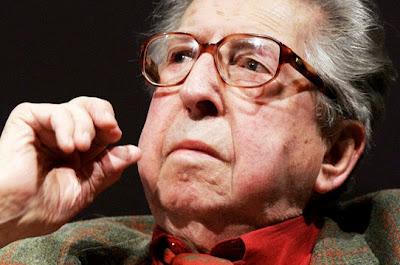by Paul J. Pelkonen

Composer Henri Dutilleux died May 22, 2013 in Paris, France.
The great French composer Henri Dutilleux has died in Paris. He was 97.Dutilleux helped guide the path of concert music in the 20th century away from the serial techniques first practiced by Schoenberg and Webern. His two Symphonies and Cello Concerto are among his most important works, complex pieces that challenged the ear while fearlessly breaking ground in the use of modes and atonality. A fierce self-critic, Dutilleux published a small catalog of pieces over a long compositional career.
Henri Dutilleux was born in Algiers in 1916. Although he studied composition at the Paris Conservatoire and won the 1938 Prix de Rome, the outbreak of World War II put his music career on hold. The composer served a year as a medical orderly in the French Army, and then taught music, managed the chorus at the Paris Opera and worked at Radio France until 1963. He later taught at the Conservatoire.
As the war continued, Dutilleux began to gain a reputation as a significant compositional voice with chamber music and songs. His 1950s output included the First Symphony (1951) which drew fiery criticism from a young French composer named Pierre Boulez.
“He was very brutal," Dutilleux told an interviewer once, (as reported in an obituary published earlier today in the Daily Telegraph.) "When he was young, he didn’t like what I wrote, and I didn’t agree with his aesthetics at all. The problem was he had a lot more power than me."
Listen to a performance of Dutilleux' Métaboles.
Later works included the Symphony No. 2 (Le Double) and the Cello Concerto 'Tout un monde lointain...' inspired by the poetry of Charles Baudelaire (and the composer's favorite work among his output) were commissioned by the Boston Symphony Orchestra. Slowly, Dutilleux began to make his reputation overseas. In 1985, Isaac Stern premiered L'arbre des songes, a violin concerto that he himself commissioned.
Other works in his sparse catalog were inspired by literature and art. Notable among these were The Shadows of Time which is dedicated to the memory of Anne Frank, and Timbres, espace, mouvement, a musical evocation of the Van Gogh painting Starry Night.
In 2012, the New York Philharmonic held a special all-Dutilleux concert to commemorate the composer being awarded the first Marie-Josée Prize for New Music. That concert featured the composer's orchestral work Métaboles and the Míro String Quartet playing Ainsi la nuit, one of his few chamber pieces. The concert ended with Yo-Yo Ma playing the aforementioned Cello Concerto. A review appeared on Superconductor.

